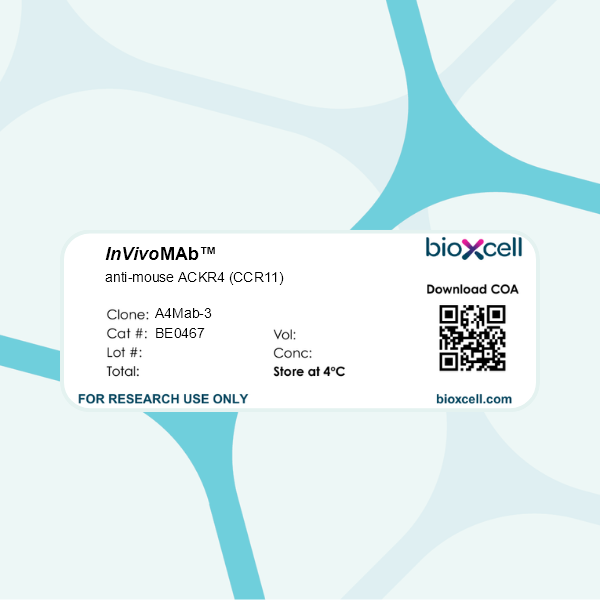InVivoMAb anti-mouse ACKR4 (CCR11)
Product Description
Specifications
| Isotype | Rat IgG2b, κ |
|---|---|
| Recommended Isotype Control(s) | InVivoMAb rat IgG2b isotype control, anti-keyhole limpet hemocyanin |
| Recommended Dilution Buffer | InVivoPure pH 7.0 Dilution Buffer |
| Immunogen | A synthetic peptide corresponding to the N-terminal extracellular region of mACKR4 (amino acids 1-19) |
| Reported Applications |
Flow cytometry ELISA For details on in vivo applications, please contact technicalservice@bioxcell.com |
| Formulation |
PBS, pH 7.0 Contains no stabilizers or preservatives |
| Endotoxin |
≤1EU/mg (≤0.001EU/μg) Determined by LAL assay |
| Purity |
≥95% Determined by SDS-PAGE |
| Sterility | 0.2 µm filtration |
| Production | Purified from cell culture supernatant in an animal-free facility |
| Purification | Protein G |
| Molecular Weight | 150 kDa |
| Storage | The antibody solution should be stored at the stock concentration at 4°C. Do not freeze. |
| Need a Custom Formulation? | See All Antibody Customization Options |
Application References
Flow Cytometry
ELISA
Hirose M, Suzuki H, Ubukata R, Tanaka T, Kaneko MK, Kato Y (2024). "Development of specific anti-mouse atypical chemokine receptor 4 monoclonal antibodies" Biochem Biophys Rep .
PubMed
Leukocyte migration is an essential function of innate and adaptive immune responses. Chemokines and their receptors control the migration system. The abundance of chemokines is controlled by atypical chemokine receptors (ACKRs), chemokine receptor-like molecules that do not couple to the G protein signaling pathways. Among them, ACKR4 regulates dendritic cell migration by controlling the ligands and is involved in tumor development in mouse models. Because no anti-mouse ACKR4 (mACKR4) monoclonal antibody (mAb) for flow cytometry has been reported, this study aimed to develop a novel mAb for mACKR4. Among the established anti-mACKR4 mAbs, A4Mab-1 (rat IgG2b, kappa), A4Mab-2 (rat IgG2b, kappa), and A4Mab-3 (rat IgG2b, kappa) recognized mACKR4-overexpressed Chinese hamster ovary-K1 (CHO/mACKR4) by flow cytometry. The dissociation constant (K D) values of A4Mab-1, A4Mab-2, and A4Mab-3 for CHO/mACKR4 were determined as 6.0 × 10-9 M, 1.3 × 10-8 M, and 1.7 × 10-9 M, respectively. Furthermore, A4Mab-1 and A4Mab-2 could detect mACKR4 by western blotting. These results indicated that A4Mab-1, A4Mab-2, and A4Mab-3 help to detect mACKR4 by flow cytometry and western blotting and obtain the proof of concept in preclinical models.

